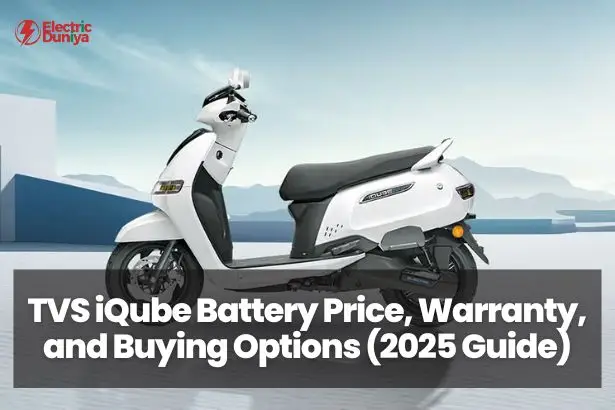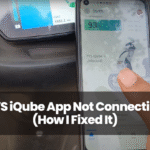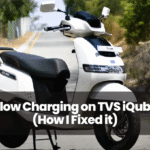When I first decided to switch to electric, the TVS iQube stood out for its smart features, smooth ride, and impressive build quality.
But like many buyers, I quickly realized the importance of understanding the TVS iQube battery price and the long-term costs involved.
Since the battery is the heart of any electric scooter, knowing the replacement cost, lifespan, and warranty coverage is essential for a hassle-free ownership experience.
In this guide, based on real-world insights and personal experience, I’ll walk you through everything you need to know about the TVS iQube battery cost, how long the battery lasts, and tips to maximise its life, so you can make the most of your electric journey.
TVS iQube Battery Price for All Variants
When I enquired at my local dealership and checked with a few authorized service centers, the replacement cost for the TVS iQube battery was quoted between ₹56,600 and ₹70,700, depending on the variant and the battery capacity.
Here’s a detailed breakdown of the TVS Scooty battery price for each model:
| Variant | Battery Capacity | Claimed Range | Top Speed | Charging Time (0-80%) |
|---|---|---|---|---|
| TVS iQube (Base) | 2.2 kWh | 75 km | 75 km/h | 2 hours |
| TVS iQube (3.4 kWh) | 3.4 kWh | 100 km | 78 km/h | 4 hr 30 min |
| TVS iQube S (3.4 kWh) | 3.4 kWh | 100 km | 78 km/h | 4 hr 30 min |
| TVS iQube ST (3.4 kWh) | 3.4 kWh | 100 km | 78 km/h | 3 hours |
| TVS iQube ST (5.1 kWh) | 5.1 kWh | 150 km | 82 km/h | 4 hr 18 min |
When I enquired at my local dealership and checked with a few authorized service centers, the replacement cost for the TVS iQube battery was quoted between ₹56,600 and ₹70,700, depending on the variant and the battery capacity.
- For the 2.2 kWh (Base model): ₹56,600–₹70,700
- For the 3.4 kWh (S/ST variants): ₹56,600–₹70,700
- For the 5.1 kWh (ST variant): Around ₹70,700
It’s important to note that the battery accounts for nearly 40–50% of the scooter’s original cost. At first, this made me a bit cautious, but after understanding the bigger picture—like battery lifespan and warranty coverage—I felt more confident in my decision to stick with electric mobility.
I also learned that lithium-ion battery prices have dropped dramatically over the last few years (almost threefold), and with more innovation coming in, we can expect even lower replacement costs in the future.
Battery Lifespan: How Long Will It Last?
When I bought my iQube, battery longevity was one of my biggest concerns. After discussing with the service team and real-world riders, I found that:
- The battery is rated for around 800 full charge cycles.
- Under normal commuting patterns (like my 30 km daily usage), this translates to about 9 years before I might see a significant reduction in performance.
- Even after that, the battery isn’t dead—it can continue to deliver 80–90% of its original capacity for another 500 cycles, although the range per charge will start dropping.
Based on my personal riding style, and assuming I maintain it well, I’m expecting a solid 8–10 years of usable life before needing a replacement.
Warranty Coverage: Peace of Mind
When I bought my scooter, TVS offered a standard warranty of 3 years or 50,000 km, whichever comes first. This covers the battery, motor, controller, and charger.
I also opted for the extended warranty plan, which cost me a little extra upfront (around ₹6,000 for my variant) but added 2 more years or 20,000 km of coverage. So now, I’m covered for up to 5 years or 70,000 km. Given how expensive a new battery is, this felt like a no-brainer investment for long-term peace of mind.
However, I had to make sure I followed all service intervals and didn’t make any unauthorized modifications—because warranty claims can get tricky if you don’t adhere to these.
Factors That Influence Battery Cost
Here are some real-world lessons I’ve picked up:
- Battery Capacity Matters: Higher kWh means more range but also a higher replacement cost.
- Smart Features Cost Extra: My iQube’s SmartXonnect features (like remote battery diagnostics) were absolutely worth it for peace of mind but do add to the overall initial cost.
- Charging Habits: Frequent fast charging can degrade the battery faster. I mostly charge at home using a slow charger overnight.
- Temperature Exposure: I make sure not to park my scooter under the hot sun for long hours, as heat can slowly degrade battery cells.
Plus, government subsidies like FAME-II played a huge role in making the upfront cost lower, which indirectly makes battery replacement seem more manageable over the years.
Final Thoughts
After living with the TVS iQube for quite some time, I can confidently say it’s a future-ready, reliable electric scooter that offers excellent value, provided you understand and plan for the battery’s role in the overall cost structure.
Yes, the battery is a significant investment, but with a long lifespan, robust warranty options, and steadily dropping replacement prices, I feel it’s a smart and sustainable choice for urban commuting.
If you’re considering buying the iQube, my advice would be: definitely factor in battery replacement and extended warranty options from day one. It makes the entire ownership experience worry-free and genuinely enjoyable.







